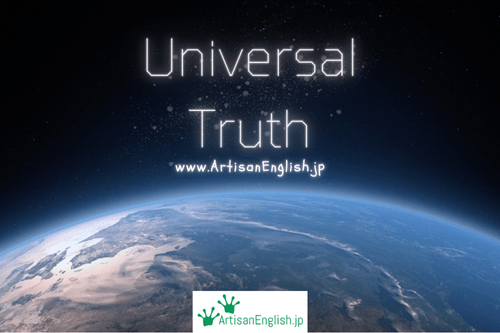
YouTube / iTunes / Spotify / Radio Public / Pocket Casts / Google Podcasts / Breaker / Overcast
Listen to ArtisanEnglish.jp posts & lesson intros here.
WotD: Universal truth
Some fundamental beliefs or principles apply to all people, at all times, and in all places.
These are known as universal truths.
They are considered timeless and objective, transcending individual perspectives and cultural differences.
Universal truths suggest certain principles and values apply to everyone, regardless of their background or beliefs.
One example of a universal truth is moral principles such as honesty, fairness, and compassion.
No matter what religion you have, the culture you share, or the country you come from, these values are commonly regarded as essential for maintaining harmonious and just societies across different cultures and civilizations.
Throughout history, people much smarter than you or me have explored and debated universal truth seeking to identify and define the principles that support human existence and the nature of reality as we understand it.
Pursuing universal truth is a driving force behind scientific inquiry, as scientists seek to uncover fundamental laws and principles that govern the natural world.
In philosophy, the search for universal truth has led to complex discussions about the nature of reality, the existence of absolute truths, and the limitations of human understanding.
Some philosophers argue that universal truths exist independently of human perception, while others say truth is inherently subjective and influenced by individual experiences and cultural contexts.
Individuals and societies wrestle with questions about morality, justice, and the nature of existence.
Recognizing and embracing universal truths can foster a sense of unity and shared understanding among diverse communities, serving as a beacon of guidance and wisdom for humanity.
Although we are all different, we all share many universal truths that bind us together.
Flesch-Kincaid Readability Test
This post is understandable by someone with at least some university-level education.
On the Flesch-Kincaid reading-ease test, this post scores 38.
The easier a passage is to read, the higher the score on a scale of 0 – 100.

